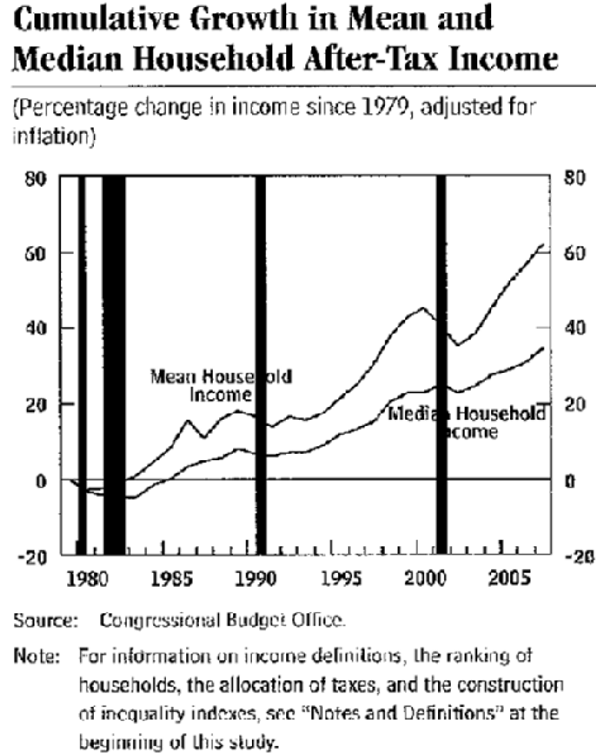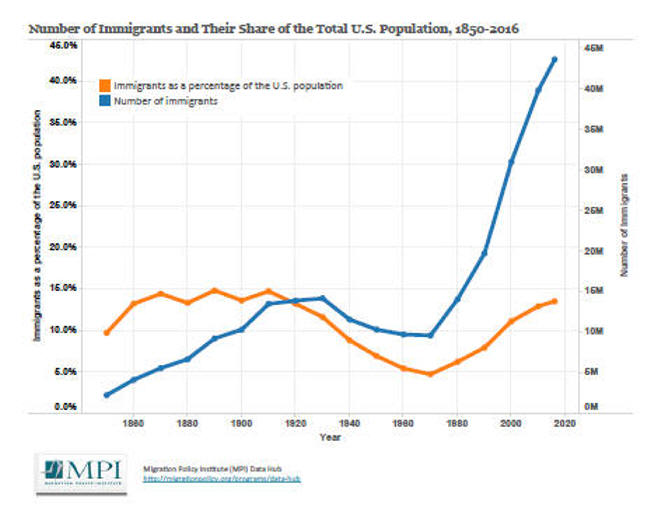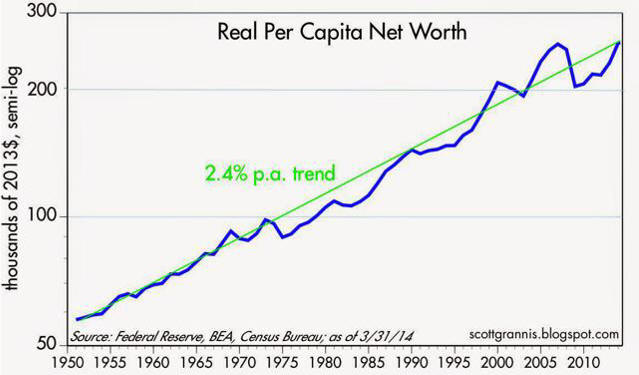|
Middle
After Tax Income Went Up

Politicians Helped Some,
Failed Others
Worker
adjusted to stagnant wages by using credit cards to increase living standards.
Then banks changed the name of home improvement loans to home equity loans
allowing
homeowners to increase their standard of living by spending equity savings.
Politicians continued to buy votes for deficits. These deficits increased the
well-being
of both worker and retirees. Politicians also tried to help average
earners buy homes
by encouraging the financial community to make mortgages
easier to obtain. The real
estate industry and banks took many shortcuts to
speed up mortgage processing and
dramatically expanded mortgage lending. Bankers and Politicians did not
realizing they had creating massive liquidity problems leading to a
Great Recession.
Increase Worker
Supply
Partially Caused by Increased
Immigration
Kept Wages Low
As in the past, workers tries to lower
immigration.

NAFTA and
Globalization hurt many American workers. Poor employment opportunities in the
Midwest, called the Rust Belt in the 1970's, had a shot
lull but returned in the 1990's when NAFTA pushed manufacturing to Mexico. Some
Mexican workers got low paying jobs with low paying U.S. manufactures. Others
Mexicans headed North for work. This created the latest battle between immigrant and
Americans for jobs and the added supply of labor pushed wages down.
Why Capitalism Creates Racism
Many
Americans are better off.
Most Older Americans have been pulled out of poverty by SS, Medicare and the
accumulation of wealth occurring after WWII.
Children
are better off because childhood diseases, such as polio, have been cured. Seat
belts and
bike helmets are now required, school transportation safety has been increased
and
they have wealth parents and grandparents to spoil them. Many baby boomers
received an larger inheritance than that received by their parents. They
also have/had company retirement and health plans. Some enjoyed society's vastly improved safety
net designed to help the poor. See
Economic Wellbeing.
Many are Dissatisfied with capitalism, politicians, educators, and business
leaders
because people compare present wellbeing economic growth with that o the
unsustainable twenty-five years following
WWII. The last time similar events occurred was after WWI and the resulting
balance sheet recession caused the Great Depression. It ended because of substantial
WW 2 industrial activity and debt.
WWII solved the problem of Fascism but left us with equally feared Communism and
more debt than we have today. Today’s debt is to make
life more
enjoyable. WW 2 debt was wasted on war. Rapid economic growth after the war increased
GDP, kept interest rates low, and the U.S. easily refinanced the her debt.
Will this happen
again?
Lower Quintiles Market Income
Up Slowly-But
Poorest Quintile 1 Helped Most
Quintiles 2 and 3 Reacting Poorly
Top Quintile Did OK
Very Top 1% and 1/10 of 1% Did
Well
Need More Data to Judge Effect of top 1%.

But
Income Distribution is a Political Question.
Some Feel Envy Assistance to Top and Bottom Caused
Populist Movement
See
Why is Poverty Controversial?
Please Use to Educate and Share!
Source
Transfers payments and taxes decreases inequality
The
Future
Fear that slow economic
growth will make current debt refinancing expensive and has may people apprehensive. So
does the expense of future commitments for
society’s
safety net. Slow growth will eventually require restructuring which will hurt
many. Is a post WWII productivity which lowered relative debt possible? Can we continue
cheap refinancing debt and
generating the production necessary to continue funding an expensive social net?
Has the
World Changed and Good Jobs Disappeared?
A return
to the Great Depression after WWII was predicted by many. It never
happened because rapid growth caused by pent-up consumer demand resulting
from WWII
savings and rationing. Economic production created by the needs of a
large baby boomer generation added to aggregate demand as did increased demand from
government spending on the Marshal Plan and the national highway system. Where
will increased AD and the resulting growth come from?
Fracking
has begun to lower energy cost and make U.S. based production more competitive.
Millennial having grown up in the Digital Age may be able to create the U.S.
monopoly power required to rapidly expand the economy and lower the relative
cost of debt. The United States is better equipped to succeed in a Flat Robotic
World than any competitor.
What
happens if growth is delayed or doesn’t happen? Politicians will not act until
the expense of carrying an ever increasing debt hurts them politically. Thankfully
this will not happen quickly
because the dollar faces little competition. The acceptance of the Euro and
Renminbi will be very slow, but it may
eventually happen.
Almost all voters are receiving many benefits from the annual deficit. Still
many
want it discontinued.
They only accept lower government expenditures which help others people.
What Makes
Me Nervous
A
disastrous rollout of Obama Care increased health cost much more than expected
It also creates a doctors shortage. The Republican controlled Congress will
cut back dramatically on the social safety net rather than working an cost
effectiveness. Unemployed college graduates
may join with dissatisfied middle class people and cause social unrest not seen since the
1960's; a time when people were not nearly as economically spoiled as they are
today.
|




